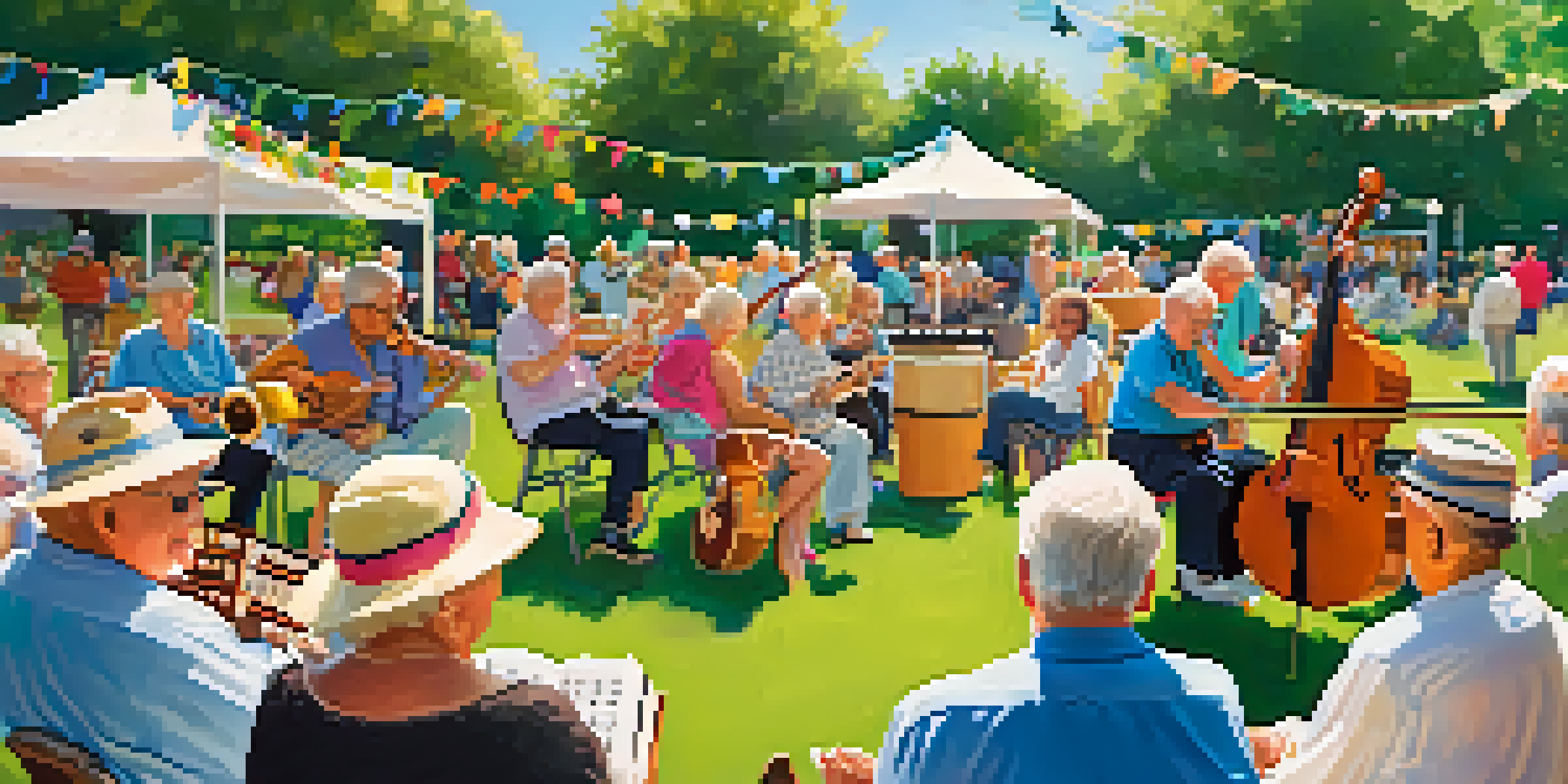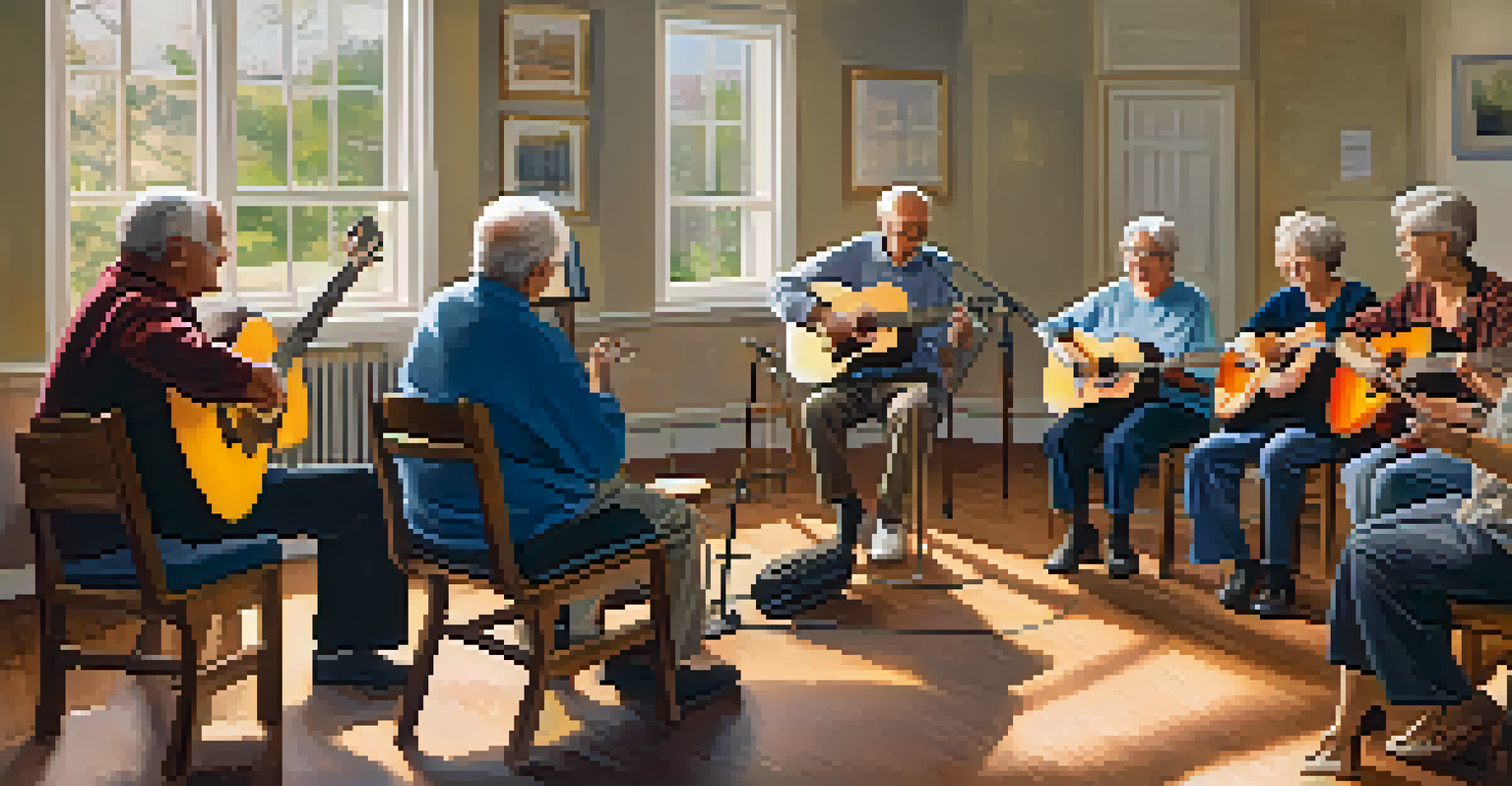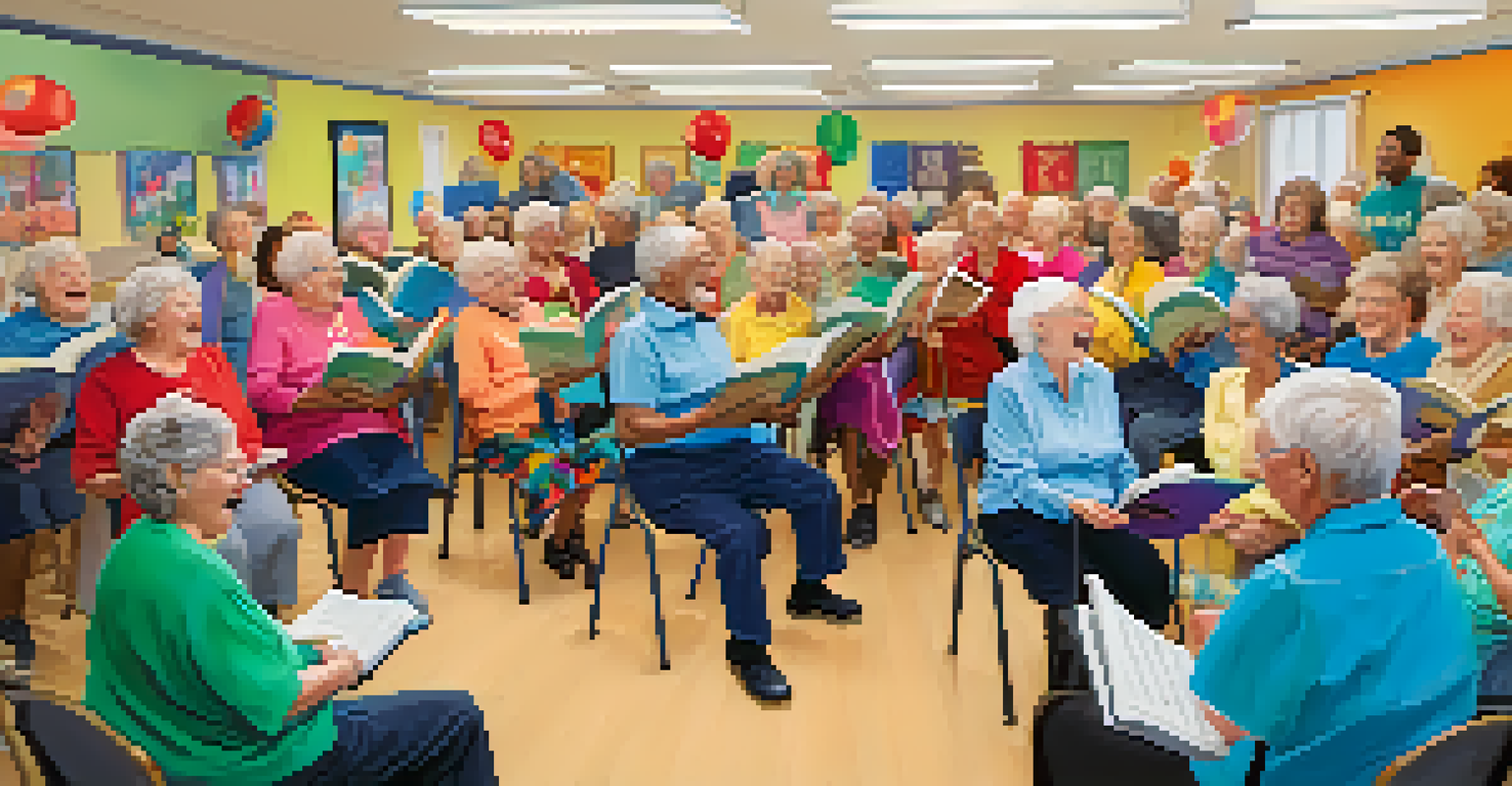The Influence of Music on Seniors' Social Interactions

The Role of Music in Social Connection for Seniors
Music has a unique ability to bring people together, and for seniors, this can be particularly significant. It often serves as a bridge that fosters connections between individuals, helping them to bond over shared tastes and experiences. Whether it's a favorite song from their youth or a more recent tune, the power of music can spark conversations and laughter, rejuvenating social interactions.
Music can change the world because it can change people.
In many senior communities, music-related activities are commonly organized, such as sing-alongs or dance sessions. These events not only encourage participation but also create an inviting atmosphere that promotes friendship. When seniors engage in music together, they often find common ground, leading to deeper and more meaningful relationships.
Furthermore, music can evoke nostalgia, reminding seniors of joyful moments from their past. This emotional connection can lead to storytelling and reminiscing, which are essential for building social ties. As they share memories tied to specific songs, seniors can create an environment rich in connection and support.
Music as a Therapeutic Tool for Seniors
Beyond social interaction, music also plays a therapeutic role for seniors, particularly those experiencing cognitive decline or isolation. Music therapy has been shown to improve mood, reduce anxiety, and stimulate memory recall in elderly individuals. By incorporating familiar tunes into their routines, seniors can experience a sense of comfort and joy.

For those with dementia or Alzheimer's, music can act as a powerful trigger for memories, helping to reconnect them with their identities. Many caregivers have noted that when seniors listen to music they love, they often become more engaged and communicative. This not only benefits the individual but also enhances the caregiver's experience, creating a more fulfilling interaction.
Music Enhances Senior Connections
Music serves as a powerful tool for fostering social bonds among seniors, encouraging shared experiences and deeper interactions.
The calming effects of music can also encourage seniors to participate in group activities more willingly. When the right tunes are playing, barriers often fade away, and seniors feel more inclined to share their thoughts and emotions. This can foster a sense of community that is vital to their overall well-being.
Live Music Events and Social Opportunities
Live music events can be a fantastic way for seniors to enhance their social lives. These gatherings provide an opportunity not only to enjoy the performance but also to engage with others in attendance. From jazz bands to classical orchestras, the variety of music available means there’s likely something for every taste.
Where words fail, music speaks.
Attending these events can spark conversations about artists, songs, and shared experiences related to music. This shared enthusiasm can quickly lead to friendships, as seniors bond over their musical preferences and memories. Additionally, the communal experience of enjoying live music can create a vibrant atmosphere that encourages socialization.
Moreover, local communities often host music festivals specifically designed for seniors, featuring both live performances and interactive activities. These events are not just entertaining; they also provide avenues for seniors to connect, dance, and even learn about new musical styles, all while forging new relationships.
The Impact of Music Genres on Senior Interaction
Different music genres can have varying impacts on social interactions among seniors. For instance, classic rock or big band music might resonate more with those who grew up during those eras, leading to lively discussions and interactions. The familiarity of certain genres can evoke fond memories, making it easier for seniors to connect with one another.
Conversely, music from different cultures, such as Latin or folk music, can introduce seniors to new experiences and perspectives. This exposure can foster curiosity and open-mindedness, encouraging seniors to engage with individuals from diverse backgrounds. As they explore new genres together, seniors can broaden their social circles and enrich their lives.
Therapeutic Benefits of Music
Incorporating music therapy can improve mood, reduce anxiety, and stimulate memory recall in seniors, particularly those facing cognitive decline.
Understanding the emotional and cultural significance of various music genres can also enhance social programming in senior communities. By curating playlists or events that reflect the diverse tastes of residents, communities can create inclusive environments that promote connectivity and interaction.
Music and Its Influence on Memory and Storytelling
Music has a profound connection to memory, often acting as a catalyst for storytelling among seniors. When a familiar song plays, it can transport them back to a specific time and place, triggering vivid memories and emotions. This phenomenon can lead to rich conversations where seniors share their life stories with others, strengthening social bonds.
These storytelling sessions can be invaluable for both personal reflection and social engagement. As seniors recount their experiences, they not only relive those moments but also provide insights to others, fostering understanding and empathy. This exchange of stories can create a supportive community that values each member's history.
Incorporating storytelling into music-based activities can further enhance the social aspect of these interactions. For example, a music-themed gathering might encourage seniors to share the stories behind their favorite songs, leading to deeper connections and mutual respect among participants.
The Role of Technology in Enhancing Musical Experiences
With the rise of technology, seniors now have unprecedented access to music that can enrich their social lives. Streaming services and music apps allow them to explore vast libraries of songs, discovering new artists and genres from the comfort of their homes. This accessibility enables seniors to curate personalized playlists that resonate with their experiences and preferences.
Moreover, technology facilitates virtual music events, allowing seniors to connect with others regardless of geographical limitations. Online concerts and group listening parties can bring together individuals who share similar tastes, fostering social interactions that might not have been possible otherwise. These digital platforms can help maintain, or even build, social connections during periods of isolation.
Community Music Programs Thrive
Community-driven music programs create opportunities for engagement and can significantly improve the quality of life for older adults.
As seniors become more tech-savvy, they can also use social media to share their musical interests and engage with others. This can create opportunities for interaction and collaboration, as they discuss songs, recommend playlists, or even form virtual music clubs. The blending of music and technology opens up a world of possibilities for enhancing social interactions.
Fostering Community Through Music Programs
Community organizations and senior centers often recognize the importance of music in fostering social connections. By offering music programs tailored specifically for seniors, they create opportunities for engagement and interaction. These programs can range from music appreciation classes to group performances, ensuring that every participant finds something enjoyable.
Participating in structured music activities can also provide seniors with a sense of purpose. Whether they are learning to play an instrument, singing in a choir, or simply attending concerts, these experiences can enhance their self-esteem and lead to more robust social interactions. The shared commitment to a musical endeavor fosters camaraderie and support among participants.

Ultimately, community-driven music programs can help alleviate feelings of loneliness and isolation among seniors. By providing consistent opportunities for social engagement through music, these initiatives can significantly improve the overall quality of life for older adults, creating a thriving social atmosphere.